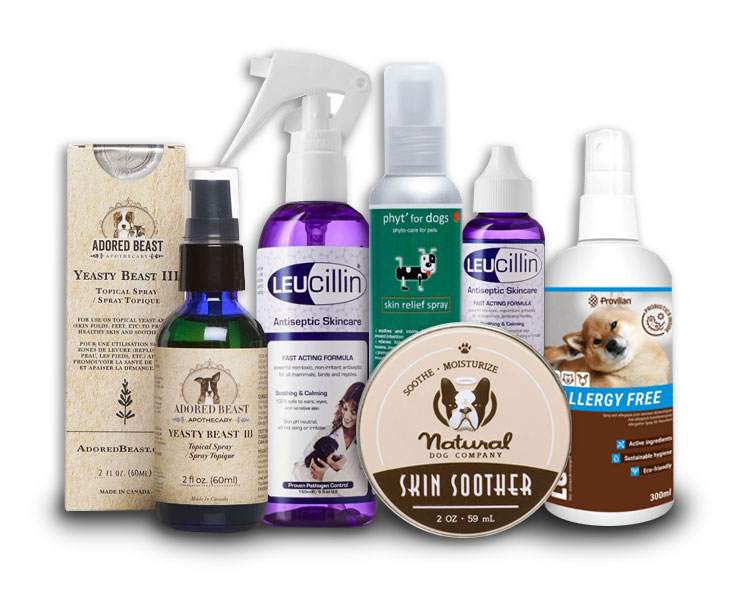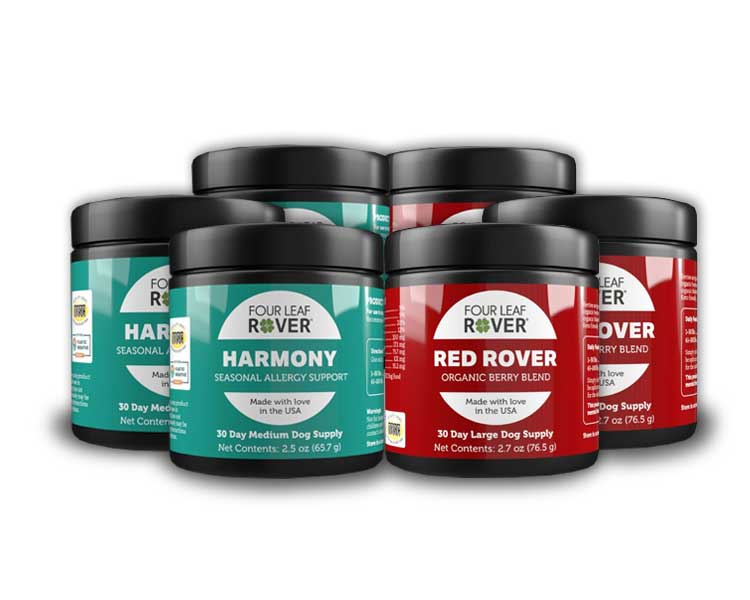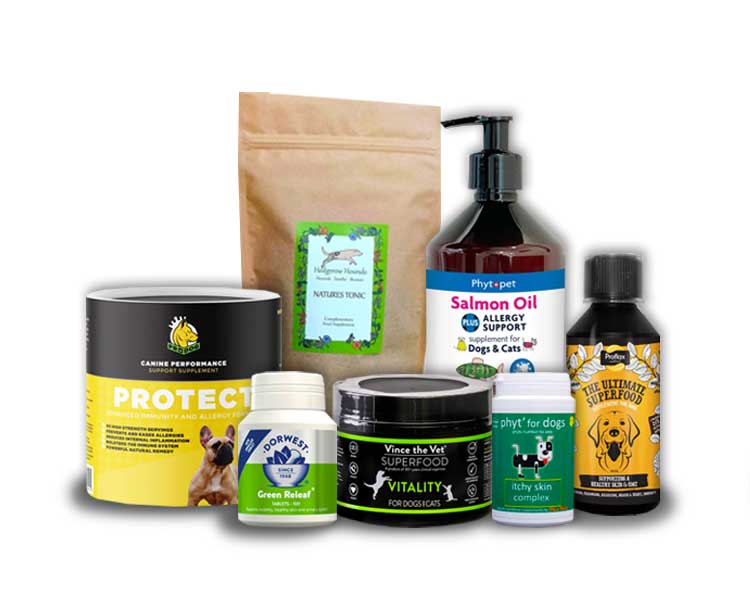
Allergies in dogs and cats are common with an array of symptoms; so what causes these symptoms and what changes could you make?
Allergies in dogs and cats are an abnormally intense / overreaction of the immune system to something that is normally harmless to the body, known as an allergen. Your pet may be born with sensitivities or for other pets, allergies are acquired over several years of continual exposure to the allergen.
Your pet, each day will also come across hundreds of harmless substances or particles, which are all part of the normal environment and which are not harmful. Under normal circumstances your pet’s immune system will recognise these and not see them as unwelcome invaders. However, in pets with allergies, the pet’s immune system will believe these common day-to-day substances as invaders that it must get rid of and therefore will mount an immune response. As the pet’s body tries to fight the “invaders” reactions in the form of allergy symptoms will appear.
So what are potential allergens your pet could react to?
Your pet could have allergic responses from both food (such as wheat) or the environment such as grasses or pollen leading to seasonal allergies. Below are a list of typical allergens, but to be honest your pet could react to anything in their environment or food.
Allergens can come from
- Fabrics – in collars, bedding, sofas, carpets
- Chemicals such as aerosols, household and car cleaning products. Laundry detergents used for your pets bedding or your own pet covers can also cause irritations.
- Rubber and plastic materials
- House dust and dust mites – which are in the environment all year around. Fleas may cause Flea Allergy Dermatitis, most commonly in cats which react to the flea saliva.
- Tree, shrub and grass pollen (in the environment for certain periods of time each year often late spring and summer), farm crops such as cereals; oil seed rape, and mould spores especially in autumn (harvesting season), ragweed
- Foods and food additives – this could be an individual protein source such as chicken, beef, grains such as wheat, corn, oats; soy, dairy, or an additive or colouring used in the manufacturing process. There is a likely link between the incidence of allergic reactions and over exposure to a protein source. If your dog or cat is not responding to steroid treatment, for example, and the diet has not been changed, then this could be a further clue than foods are the cause of the allergic response.
- Many treats, chews and palatable medicating products contain additives, cereals, beef extract and other proteins which could act as allergens.
If your pet only has a reaction such as itching during the spring and summer months then they are most likely to have an allergy to something at that time, such as tree and or grass pollen. If, however your pet continues to have allergic reactions outside of these seasons, then this likely points to an all-the-year source.
What are typical symptoms of pet allergies?
Dogs and cats must generally be exposed to the allergen for some time before the allergy develops. Allergic conditions are considered often to be made worse by stress, so the general environment, overall health and well-being of the pet as well as nutritional and immune status may play a part in both the initiation and progress of the condition. The types of symptoms your pet will exhibit will depend on the specific allergy.
How does the body respond to an allergen?
- An itching sensation over any part of the body leading to scratching and/or excessive licking causing redness and often damaged skin and hair loss. Your pet may rub their faces on the carpet. The skin may become dry and crusty or oily. It is also common to get secondary bacterial infections of the skin due to these self-inflected lesions.
- “Hot spot” lesions which appear suddenly, as very moist, often smelly and intensely itchy sores with hair loss and weeping of serum.
- Flea Allergy Dermatitis, as the name suggests, causes skin lesions, usually in cats. Many small crusty lesions develop, often over the rump initially, but they may extend to much of the body and cause constant long-term irritation unless contact with fleas can be prevented. Veterinary attention should be sought to settle the condition in the first instance.
- Sore, inflamed and often smelly ears. Recurrent ear infections as the wax-producing glands in the ear overproduce as a response to the allergy.
- Paws which are swollen / chewing on the feet
- Red / watery eyes, which can be swollen.
- Sneezing / coughing/ wheezing as a result of inflamed sinuses or airways. Excess mucus and nasal discharge.
- Gastro-intestinal issues such as wind, diarrhoea, increased bowel movements, sickness, anal gland problems.
Because the symptoms of inflammation are produced from the inside out, creams, sprays and shampoo, whilst providing much needed relief during a flare-up, can only provide temporary relief. Likewise, avoiding exposure, as far as possible, to the agent causing the reaction will help reduce symptoms and may slow worsening of the reaction over time. The long-term solution, however, must focus on balancing the immune system.
So, what could help your pet?
One of the most important steps to fighting allergies is catching your pet’s allergic response early on. You may identify symptoms before it develops to a systemic response. However, if your animal is sore, swollen, red, or itchy then it is best that you visit your vet to get a diagnosis.
Nutrition – feed your pet a wholesome, non-allergenic (and certainly avoiding any known allergens), biologically appropriate food that allows the immune system to heal. Ideally low grain and gluten-free. Include variety to ensure that your pet is less likely to react to the same monotonous foods and to give balance and a healthy immune response.
Soothing - consider a spray to help alleviate discomfort, itching & Irritation such as LUCAA+ Pet Probiotic Allergen-Free Spray, PetNat Aller-Itch Spray, Diet' Dog Skin Relief Spray, or Leucillin Spray

Bathe – to help keep allergens off your dog or cat shampoo frequently, which is chemical, paraben-free, pH balanced and contain no nasties. Products include PetNat Dermacton Shampoo Bar, Wildwash Pro Shampoo for Sensitive Coats , Hownd Got An Itch, 4-Legger Hypoallergic Unscented Shampoo and Phyt for Dogs, Sensitive Skin Shampoo, or Natural Dog Company Itchy Skin Shampoo. Also brush your dog’s coat on a regular basis.
Foot Soaks – consider keeping your pets paws clean to reduce the amount / likelihood of allergens that your pet can bring in from outside, especially if your dog licks his / her feet. Use 4-Legger Restore Apple Cider Vinegar Rinse to keep paws healthy but also allergen free.
Minimise your pet’s exposure to chemicals- think what chemicals the pet’s bedding is washed in, or the towels that are used to dry your dog down after a walk. Clean bedding, carpets, soft furnishing materials regularly using low allergen washing products, to reduce allergen contamination and exposure to aggravating chemicals. Products to consider are included in the Provillan EVAA / LUCAA and DENAA range. For cats, choose a dust-free cat litter and change it frequently to avoid build-up of urine vapour products.
Control fleas and other parasites which may aggravate any skin or potentially respiratory reactions; reduce dust mites by frequent vacuum cleaning. Refer to our Flea Prevention Blog.
Supplementation – herbal supplements for skin problems, containing natural anti-inflammatory and anti-histamine compounds to help relieve the irritation of itchy skin caused by seasonal allergies include Four Leaf Harmony Seasonal Allergy Support, Four Leaf Rover Red Rover Berries, PhytoPet Herbal Allergy Aid or ProDog Protect Dog Supplement for Itchy Skin .
 Also consider supplements such as probiotics to help balance the body’s immune system and omega-3 and omega-6 essential fatty acids supplements such as Proflax Skin & Coat, Phytopet Salmon Oil Plus Allergy Support, Nordic Naturals, or Dorwest Evening Primrose Oil, which are anti-inflammatory. Dorwest Garlic & Fenugreek and Green Releaf tablets,
Also consider supplements such as probiotics to help balance the body’s immune system and omega-3 and omega-6 essential fatty acids supplements such as Proflax Skin & Coat, Phytopet Salmon Oil Plus Allergy Support, Nordic Naturals, or Dorwest Evening Primrose Oil, which are anti-inflammatory. Dorwest Garlic & Fenugreek and Green Releaf tablets,

To read more download this factsheet: Factsheet: Allergies in Pets
If you have any questions and for more information feel free to contact us direct at [email protected]









